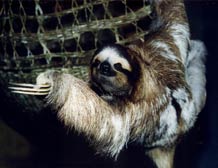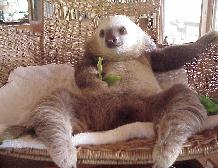

Adopt A Sloth
The Program
Sloths, as their very name implies, have long been associated with one dominant characteristic: Laziness. In reality however these unique tropical mammals are a fascinating blend of adaptations. Belonging to the Edentate family, as are the armadillo and anteater, sloths fall into two very distinct categories: the two-fingered sloth and the three-fingered sloth. This delineation arises from the number of clawed fingers on the forelegs of the different species as both possess three toes on their hindlegs.


Wonderfully adapted to their arboreal habitat these species exhibit numerous similarities, not the least of which are their conspicuous scimitar-like claws, used for climbing. In addition both are highly specialized for a diet consisting of energy rich but highly indigestible mature and young leaves. Their ruminant -like (chambered) stomachs contain active bacteria that work to break down these leaves. This is a slow process however, evidenced by the fact that the digestive cycle for sloths is measured in days instead of hours! Associated with this torpidity is the characteristic lethargic behavior as well as the unusual trait of coming down to the forest floor to defecate only once every 5-8 days!
Furthermore, sloths do not exert themselves by internally regulating their temperatures, instead they follow the method of cold-blooded creatures and allow the environment to dictate thermoregulation. Unlike the nocturnal two-fingered sloth, the diurnal three-fingered sloth actively seeks out the sun for basking so as to raise its body temperature. Despite what is known, in many ways these fascinating creatures remain somewhat of a mystery and only with continued observation and association will a more illuminating light be shed upon them and their ways.
Why Adopt
The occurrence of an injured and/or orphaned sloth is becoming ever more common in many areas of Costa Rica. Whether this is due to continued deforestation, encroaching human settlement, the black market pet trade or mother sloths being too afraid to come down and retrieve fallen babies, the problem continues to exist. On a grand scale the rescue and reintroduction of these sloths into the wild represents a positive step towards maintaining the balance of the New World neotropical rainforest ecosystem - one of the most important and complex ecological networks on the planet. More simply however, sloths are amazing creatures that sometimes need - and deserve- our help.
Your Adoption
By adopting a sloth you are contributing to the future of these wonderful creatures in a number of very important ways:
Adoption Packages
Package A
Package includes:
Package B
Package includes:
Package C
Package includes:
To Adopt A Sloth
Adopters Name:_____________________________
Address:___________________________________
Telephone:( ___ )____________________________
Email:_____________________________________
I wish to adopt:______________________________
Checks payable to "Aviarios del Caribe, S.A."
MEMO: Adopt-a-Sloth Program
(Please do not send cash in the mail. Registered mail for other payment type is preferable)
Luis and Judy Arroyo
P.O. Box 569-7300, Limon, Costa Rica, C. A.